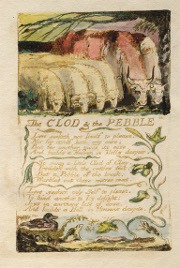Songs of Innocence and Experience Contents
- Social / political context
- Religious / philosophical context
- Literary context
- Textual history
- Songs of Innocence
- Introduction (I)
- The Shepherd
- The Ecchoing Green
- The Lamb
- The little black boy
- The Blossom
- The chimney sweeper (I)
- The little boy lost (I)
- The Little Boy Found
- Laughing song
- A Cradle Song
- The Divine Image
- Holy Thursday (I)
- Night
- Spring
- Nurse's Song (I)
- Infant Joy
- A Dream
- On Another's Sorrow
- Songs of Experience
- Introduction (E)
- Earth's Answer
- The Clod and the Pebble
- Holy Thursday (E)
- The Little Girl Lost
- The Little Girl Found
- The Chimney Sweeper (E)
- Nurse's Song (E)
- The Sick Rose
- The Fly
- The Angel
- The Tyger
- My Pretty Rose-tree
- Ah! Sun-flower
- The Lilly
- The Garden of Love
- The Little Vagabond
- London
- The Human Abstract
- Infant Sorrow
- A Poison Tree
- A Little Boy Lost (E)
- A Little Girl Lost
- To Tirzah
- The Schoolboy
- The Voice of the Ancient Bard
- A Divine Image
The Clod and the Pebble - Synopsis and commentary
Synopsis of The Clod and the Pebble

A lump of clay sings that love is totally concerned with the good of others, and should be oblivious to its own needs. By acting in this way, it creates heaven in the midst of the despair of hell. The clod sings this while it is trodden upon by cattle. But a pebble in the brook sings another song. Love is totally directed towards itself. It is cruel and possessive, creating hell in the midst of heaven.
Commentary
This poem looks at two different forms of natural material – soft clay and hard stone – and the two different approaches to life which they represent, while they remain part of one reality. In this, it relates to the pastoral genre.
The opening stanza reads like the confident assertion that might be heard in a sermon. It echoes a well-known passage from the Bible about love, (1 Corinthians 13:4-7) and does not try to justify its self-evident ‘truth'. It, therefore, comes as a shock to learn the identity of its speaker. It may seem hard to associate this noble idea of love with something as unattractive as a clod of clay. If the reader agrees that love should be selfless, does that imply the acceptance of being trodden upon? The reader is thus faced with his / her own attraction to - and revulsion by - this notion of love and vision of heaven.
Expectations are further undermined by the pebble. The diction ‘warbled' and ‘metres meet (fitting or appropriate)' is characteristic 18th century language which might lead the reader to anticipate another improving and decorous ‘moral fable' (see Literary context > Enlightenment literature). Further, the pebble in the brook appears to have a more advantageous identity and situation:
- Which sounds more appealing, a clod or a pebble?
- Would you rather be in a fresh brook or under the feet of heavy cattle?
Readers might therefore anticipate an opinion to match the more appealing nature of the pebble. They are unprepared for the deeply cynical view of love which follows.
At the end of the poem, readers are left in a dilemma. The pebble does, indeed, seem better off than the clod, even though its view may be repellent. They may agree with the clod's sentiment but feel unable to embrace its fate. Blake makes his readers confront:
- A too easy, superficial acceptance of self less love which is unaware of the cost
- Human attraction to the fruits of selfish love.
In this way, he suggests that:
- Both heavenly and hellish attitudes are aspects of human experience
- It is the choices made by individuals that create heaven and hell in their present lives.
Investigating The Clod and the Pebble
- Do you think that the clod and the pebble represent the only choices available regarding behaviour?
- English Standard Version
- King James Version
